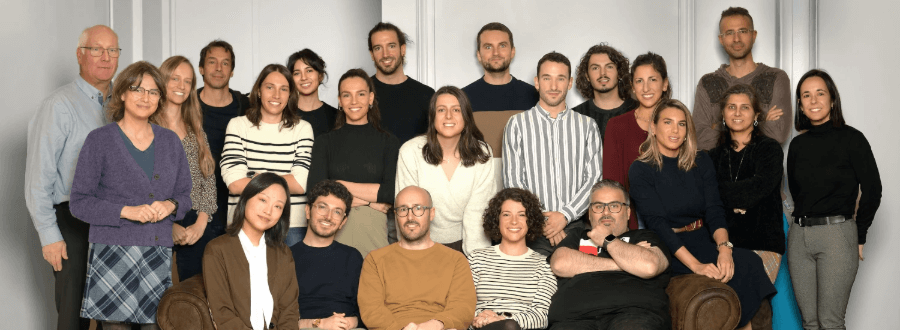
ZYMVOL raises €3 million in a financing round to boost enzyme discovery and development
Biotechnology company ZYMVOL, located in the Barcelona Science Park, has closed a €3 million seed funding round led by venture capital firms Faber Ventures (lead investor), Elaia Partners (existing pre-seed investor), and Übermorgen Ventures. Since its founding in 2017, ZYMVOL has established itself as a leader in computational enzyme discovery and design. The company collaborates with the R&D teams of some of the world’s largest companies to transform their production processes, driving innovation and reducing environmental impact, through tailor-made enzyme solutions.
“Enzymes are like small chemical factories responsible for all the transformations that occur in nature. ZYMVOL harnesses the power of enzymes to offer clean and sustainable chemical processes to companies that want to improve their products and operations, paving the way for a better world,” explains Maria Fátima Lucas, CEO of ZYMVOL. Over the years, the biotechnology startup has successfully completed more than 100 projects in various sectors, mainly in the pharmaceutical and chemical industries, collaborating with global clients such as Axplora, Medichem and Sanofi.
With a growing team of over 20 multidisciplinary employees and offices in both Barcelona and Boston, the company is now ready for new challenges. Its ambitious plan includes improving its experimental laboratory located in the Barcelona Science Park; expanding its proprietary computational technology; expanding its sales and marketing team to reach new customers; and bringing its first custom enzyme kits to market.
“Enzymes drive innovation in diverse sectors, from sustainable manufacturing to pharmaceutical breakthroughs. However, biocatalysis presents significant challenges: enzyme discovery and design remain complex, costly, and time-consuming processes. ZYMVOL’s advanced computational solutions not only improve efficiency, but also strengthen industrial resilience, drive sustainable innovation, and shape the future of global production,” says Sofia Santos, Partner at Faber Ventures.
“In recent years, ZYMVOL has revolutionized the way enzymes are discovered and designed. ZYMVOL currently outperforms alternative solutions in all key factors, including speed of development, specificity and efficiency. We are delighted to continue supporting the company as it expands its enzyme portfolio and scales its operations internationally,” says Sébastien Lefebvre, Partner at Elaia.
Simulating millions of in silico experiments
Enzymes are biocatalysts, proteins that are found naturally in living organisms and are responsible for “catalyzing” (accelerating) millions of chemical reactions. For decades, various industries have used them to improve the properties of their products (for example, detergents with better stain removal capacity, lactose-free milk, etc.), as well as to replace polluting catalysts.
Despite the ability of an enzyme to be applied in industrial chemical processes, it must first be optimized with enzyme engineering to withstand the factory environment, as significant changes in pressure and temperature can render it useless. But traditional enzyme engineering often requires months or years of work in the laboratory, with massive experiments based on “trial and error”, making it an unpredictable and expensive process.
ZYMVOL’s technology revolutionizes this process. The company uses highly realistic computer simulations that mimic experimental conditions with more than 90% accuracy. This approach dramatically reduces development time and cost, allowing only the most promising variants to reach laboratory testing.
The future is made of enzymes
If there is one thing that enzymes are known for, it is their environmental friendliness. The application of a biocatalyst in an industrial process can eliminate – or significantly reduce – the need for toxic chemicals. Furthermore, thanks to their ability to function under temperate conditions, they do not need to be accompanied by high temperatures or pressures, which means energy savings.
Many companies face the challenge of maintaining their competitiveness while adapting their processes to the regulatory requirements of sustainable manufacturing. In this context, biocatalysts are presented as an effective solution to address these demands. “Biocatalysts have proven to be an effective solution to reduce emissions and harmful chemicals in industrial production, but they are still underused due to the complexity of their implementation,” says Maria Fátima. “With ZYMVOL, we work to make enzymes accessible to everyone, so that green chemistry becomes the new norm”.
» More information: ZYMVOL website [+]




